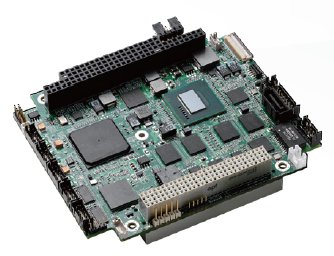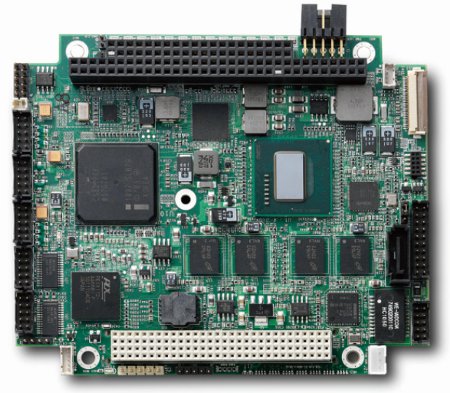Rugged PC/104-Plus SBC uses Atom E600 SoC
Nov 16, 2011 — by Eric Brown — from the LinuxDevices Archive — 2 viewsAdlink announced a rugged, extended-temperature PC/104-Plus single board computer (SBC) with an Intel Atom E600 clocked at up to 1.6GHz. The CoreModule 720 includes up to 2GB of soldered DDR2 RAM and an optional solid state drive up to 16GB, an SDIO/MMC socket, SATA connectors, plus gigabit Ethernet, USB 2.0, serial, DVI, LVDS, and CAN connectivity.
The CoreModule 720 is said to be designed for applications in harsh environments such as transportation, self-service, digital signage, and video surveillance. It's the latest in Adlink's line of "Extreme Rugged" branded CoreModule SBCs; previous entries include last year's dual-core Atom-based CoreModule 745 and single-core Atom CoreModule 740.

Adlink CoreModule 720
The CoreModule 720 is available with three extended-temperature models, selected from among the eight E600 choices Intel offers. These range from the 600MHz, 2.7-Watt TDP E620T, to the 1.3GHz, 3.3 TDP E660T, on up to the 1.6GHz, 3.9 TDP E680T, says Adlink.
On the CoreModule 720, all three SoCs support extended temperatures up to -40 to 185 deg. F (-40 to 85 deg. C), says the company. This appears to be an option, however, as a standard temperature range of -4 to 158 deg. F (-20 to 70 deg. C) is also listed.
The 3.77 x 3.54-inch printed circuit board (PCB) is said to be 50 percent thicker than a typical SBC, for greater robustness. Shock and vibration resistance is also cited (see spec list below).

Top-down view of the CoreModule 720
(Click to enlarge)
The CoreModule 720 provides a gigabit Ethernet port, four USB 2.0 ports, and four serial ports, including two RS232/422/485 ports, says Adlink. Other I/O is said to include a CAN bus, as well as DVI and LVDS video connections. PC/104-Plus expansion connectors are said to support ISA and PCI bus connectivity.
Features and specifications listed by Adlink for the CoreModule 720 include:
- Processor — Intel Atom E620T (600MHz, 2.7-Watt TDP), E660T (1.3GHz, 3.3-Watt TDP), or E680T (1.6GHz, 3.9-Watt TDP)
- Chipset — Intel EG20T
- Memory — up to 2GB soldered DDR2 600/800MHz RAM
- Storage:
- SDIO/MMC socket
- 2 x SATA II ports
- optional 4GB or 16GB onboard SATA SSD
- Expansion — PC-104/Plus connectors
- Networking — gigabit Ethernet
- Other I/O:
- DVI (up to 1280 x 1024 pixels)
- LVDS (24-bit single-channel. up to 1280 x 768 pixels)
- 4 x USB 2.0
- 2 x RS232
- 2 x RS232/422/485
- CAN bus (single-channel)
- Power requirements — AT mode input (5 V +/- 5%)
- Operating range — -4 to 158 deg. F (standard); -40 to 185 deg. F (extended)
- Shock resistance (non-operation) — 50G peak-to-peak, 11ms duration (MIL-STD-202G Method 213B)
- Vibration resistance (operation) — 11.95 Grms, 50-2000 Hz, each axis (MIL-STD-202G Method 214A)
- Dimensions — 3.77 x 3.54 inches (99 x 90mm)
Availability
No pricing or availability information was provided on the CoreModule 720, which is said to support Linux, Windows CE 6.0, Windows XPe, VxWorks 6.8, and QNX 6.4. More information may be found on the Adlink CoreModule 720 product page.
This article was originally published on LinuxDevices.com and has been donated to the open source community by QuinStreet Inc. Please visit LinuxToday.com for up-to-date news and articles about Linux and open source.